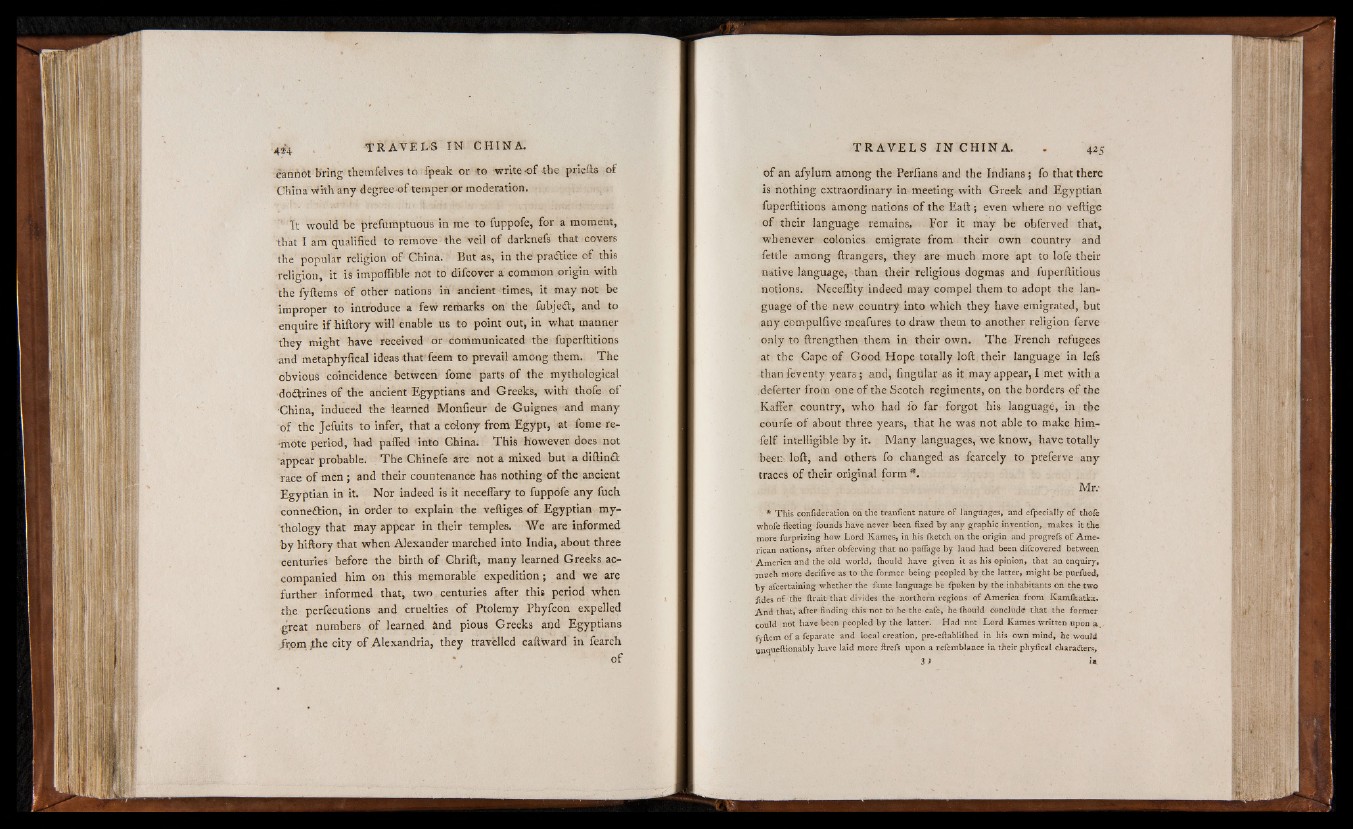
cannot bring themfelves to fpeak or .to write .of the prleHs o f
China vikh any degree-of temper or moderation.
It would be prefumptuous in me to fuppofe, for a moment,
that I am qualified to remove the veil o f darknefs that covers
the popular religion of' China. But as, in the pra£tice o f this
religion, it is impoffible not to difcover a common origin with
the fyftems o f other nations in ancient times, it may not be
improper to introduce a few remarks on the fubjed, and to
enquire i f hiftory will enable us to point out, in what manner
they might have received or communicated the fuperftitions
and metaphyfical ideas that feem to prevail among them. The
obvious coincidence between fome parts o f the mythological
dofrrines o f the ancient Egyptians and Greeks, with thofe o f
•China, induced the learned Monfieur de Guignes and many
of the Jefuits to infer, that a colony from Egypt, at fome remóte
period, had paffed into China. This however does not
"appear probable. The Chinefe are not a mixed but a diftind
race o f m en ; and their countenance has nothing o f the ancient
Egyptian in it. Nor indeed is it necefiary to fuppofe any fuch
connedion, in order to explain the veftiges o f Egyptian mythology
that may appear in their temples. We are informed
by hiftory that when Alexander marched into India, about three
centuries before the birth o f Chrift, many learned Greeks accompanied
him on this memorable expedition; and we are
further informed that, two centuries after this period when
the perfecutions and cruelties o f Ptolemy Phyfcon expelled
great numbers o f learned 4nd pious Greeks and Egyptians
from the city of Alexandria, they travelled eaftward in fearch
o f
o f an afylum among the Perfians and the Indians; fo that there
is nothing extraordinary in meeting with Greek and Egyptian
fuperftitions among nations o f the Eaft ; even where no veftige
o f their language remains, For it may be obferved that,
whenever colonies emigrate from their own country and
fettle among ftrangers, they are much more apt to lofe their
native language, than their religious dogmas and fuperftitious
notions. Neceffity indeed may compel them to adopt the language
o f the new country into which they have emigrated, but
any compulfive meafures to draw them to another religion ferve
only to ftrengthen them in their own. The French refugees
at the Cape o f Good Hope totally loft their language in lefs
than feventy years; and, fingUlar as it may appear, I met with a
deferter from one o f the Scotch regiments, on the borders o f the
Kaffer country, who had fo far forgot his language, in the
courfe o f about three years, that he was not able to make him-
felf intelligible by it. Many languages, we know, have totally
been loft, and others fo changed as fcarcely to preferve any
traces o f their original form *.
Mr/
* This confideration on the tranfient nature o f languages, and efpecially of thoie
whofe fleeting founds have never been fixed by any graphic invention, makes it the
more furprizing how Lord Karnes, in his iketch on the origin and progrefs o f American
nations, after obferving that no pafiage by land had been difcovered between
America and the old world, ihould have given it as his opinion, that an enquiry,
much more decifive as to the former being peopled by .the latter, might be purfued,
by afcertaining whether the fame language be fpoken by the inhabitants on the two
fides of the ftrait that divides the horthern regions o f America from Kamikatka.
A n d that,'after finding this not to be-the cafe, he fhould conclude that the former
could not have been peopled by the latter. Had not Lord Karnes written upon a„
fyftem of a feparate and local creation, pre-eftablilhed in his own mind, he would
unqueftionably have laid more ftrefs upon a refemblance in their phyfical chara&ers,
3 I is.